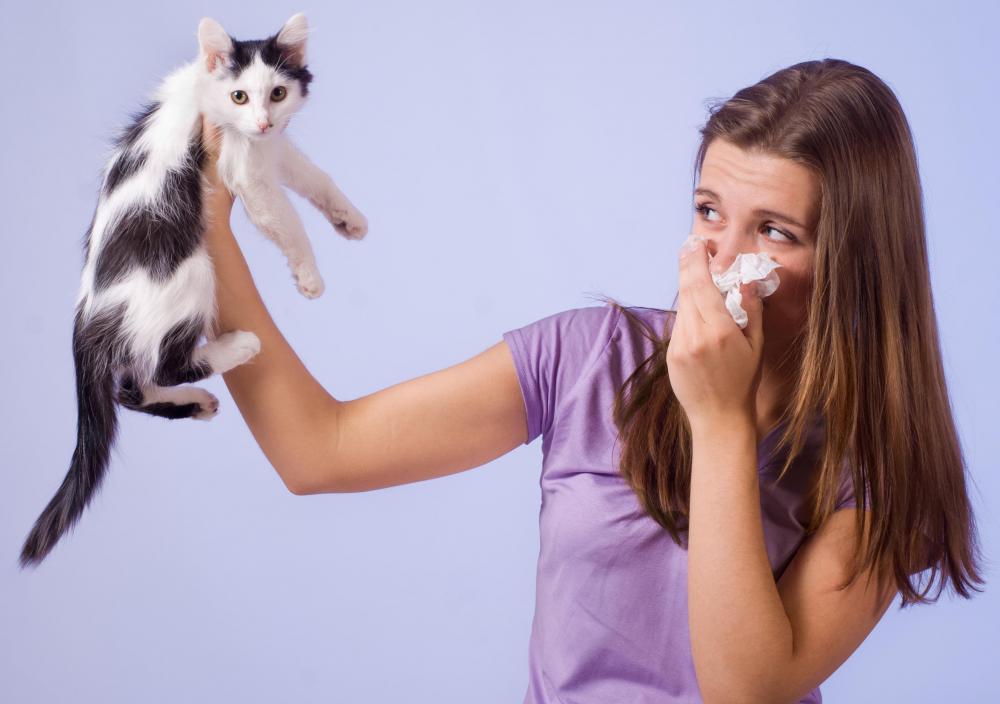At WiseGEEK, we're committed to delivering accurate, trustworthy information. Our expert-authored content is rigorously fact-checked and sourced from credible authorities. Discover how we uphold the highest standards in providing you with reliable knowledge.
What Are the Common Causes of an Allergic Reaction to Pets?
Sneezing, watery eyes, sinus congestion and general irritation — all are signs of an allergic reaction to pets. The exact cause of a pet allergy can be difficult to determine, as speculations abound. Some individuals claim that various animal breeds incite allergic reactions, while others point to the length of pet hair as the culprit. Despite the myths and hypotheses, the most common cause of an allergic reaction is dander — the tiny flakes of exfoliated skin shed by the pet. Other common causes include allergic reactions to pet saliva and urine.
Individuals suffering an allergic reaction to pets have hyper-sensitive immune systems. Not all types of allergic reactions are the same. Some individuals allergic to plant pollen may or may not also be allergic to pets, and vice versa. The cause of a pet allergy lies with the proteins in animal dander, urine and saliva. These proteins stimulate the immune system of sensitive persons, triggering immune system responses similar to those of the common cold or influenza.

Pet dander is regularly shed from the exfoliating skin of dogs and cats. Small droplets of saliva from the cat or dog are left behind as they pant or lick their fur. Urine droplets adhere to fur or are scattered throughout the home. Contrary to popular belief, animal hair is usually not the cause of an allergic reaction to pets, but hair is the repository for the allergens.

The microscopic proteins from dander, urine and saliva dry up and become airborne. These particles infiltrate the respiratory system of the allergic person, whose immune system reacts sharply. The immune system produces immunoglobulin E (IgE) antibodies and histamine, causing the recognizable feelings of malaise, swelling and congestion.
Since the symptoms of an allergic reaction to pets mimics the symptoms of the common cold and other viral diseases, the best method for determining a true pet allergy is through a medical exam and blood or skin test. A lab technician conducts what is called a radioallergosorbent (RAST) test, which examines various common allergens and checks the blood for reactions to the allergens. While not a comprehensive test for all allergies, the test does help determine the cause for many common allergies, including allergic reactions to dogs and cats.

Treating an allergic reaction to pets depends largely on the sensitivity of the individual and the presence of pets in the environment. Most individuals avoid cats and dogs altogether. Antihistamines relieve the congestion, swelling and redness associated with the body's production of histamine. Anaphylactic shock, a possibly fatal allergic reaction of difficulty breathing, rapid pulse and weakness, requires emergency medical attention and treatment with epinephrine. Other common medical treatments include corticosteroids, decongestants and allergy shots or pills that reduce immune system responses.
AS FEATURED ON:
AS FEATURED ON:



















Discussion Comments
@MrsPramm - It's definitely something you can live with. My father was allergic to cats but he put up with them as family pets as long as we kept them away from the places where he went in the house. He even grew to become very fond of them. Mostly his allergies would act up if he had to stay in an area where they had been allowed to shed.
@Iluviaporos - There is a reason that cats and dogs have been so popular over the years though. They are the perfect mixture of affectionate, robust and loyal to suit most people. Someone with severe allergies might have to say goodbye to the hope of having a pet dog or cat, but minor allergies probably wouldn't stop me. I'd just invest in antihistamines and vacuum the house every day. There are also some kinds of dogs and cats that are supposed to be relatively hypoallergenic so it might be worth looking into that.
I'm allergic to dust and I become absolutely miserable when I can't get away from it. If I had an allergy to dogs or cats, there would be no question of trying to keep one at my house.
I know that people like having the companionship, but there are other animals that can be just as affectionate. I'd suggest looking into having a pot-bellied pig or maybe a parrot if you want intelligent company and if you just want snuggles, a rabbit or chinchilla would be a great compromise.
Post your comments